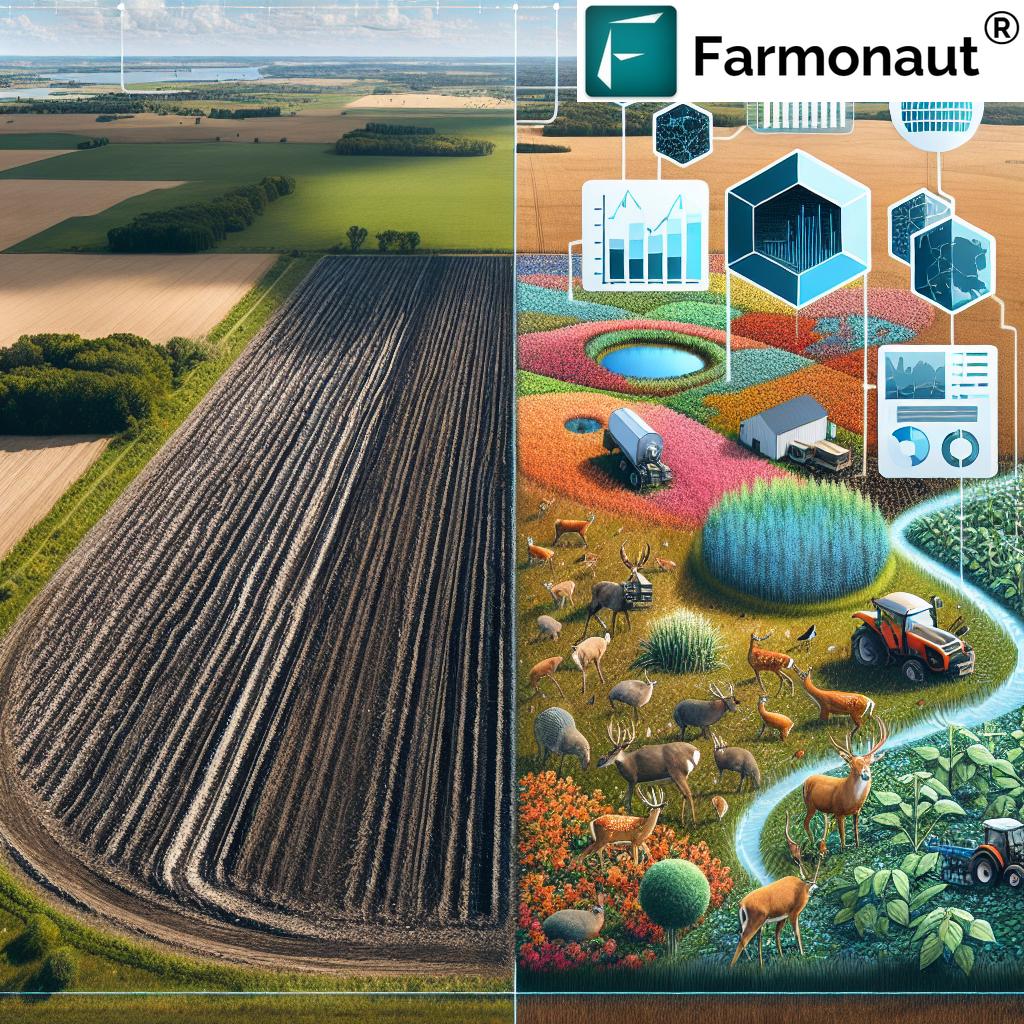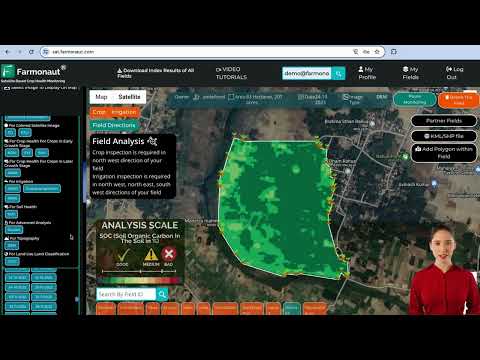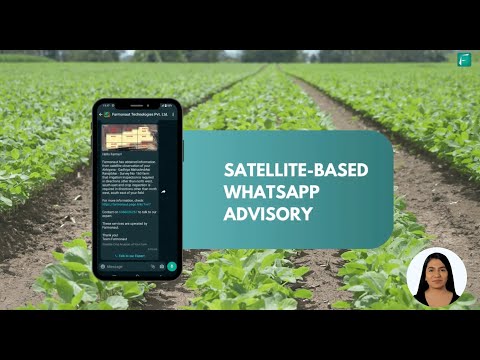Revolutionizing Illinois Farms: Climate-Smart Agriculture Meets Wildlife Conservation with Farmonaut’s Sustainable Practices
“Illinois farmers can access substantial funding for implementing eco-friendly practices, potentially improving soil health on thousands of acres.”
Welcome to a comprehensive exploration of how climate-smart agriculture and wildlife conservation are transforming the farming landscape in Illinois. As we delve into this crucial topic, we’ll uncover the innovative practices that are not only revolutionizing agriculture but also safeguarding our precious ecosystems. At Farmonaut, we’re proud to be at the forefront of this agricultural revolution, offering cutting-edge solutions that empower farmers to embrace sustainable practices while enhancing productivity.
The Intersection of Agriculture and Conservation in Illinois
Illinois, known for its vast agricultural lands, is at a pivotal point where traditional farming methods are giving way to more sustainable, environmentally conscious practices. This shift is not just about improving crop yields; it’s about fostering a harmonious relationship between agriculture and nature. Let’s explore how climate-smart farming techniques are making a significant impact on both the agricultural landscape and wildlife conservation in the Prairie State.

Climate-Smart Agriculture: A Game-Changer for Illinois Farms
Climate-smart agriculture is more than just a buzzword; it’s a comprehensive approach to farming that addresses the challenges posed by climate change while promoting sustainable food production. In Illinois, farmers are increasingly adopting these practices to ensure long-term viability and environmental stewardship.
Key Components of Climate-Smart Farming in Illinois
- Soil Health Management: Implementing no-till farming and cover cropping to enhance soil structure and fertility.
- Water Conservation: Adopting efficient irrigation systems and water management techniques to preserve this vital resource.
- Biodiversity Protection: Creating habitat corridors and implementing integrated pest management to support local ecosystems.
- Carbon Sequestration: Utilizing practices that increase carbon storage in soil, reducing greenhouse gas emissions.
At Farmonaut, we provide advanced satellite-based monitoring tools that help farmers implement these climate-smart practices effectively. Our technology allows for precise monitoring of crop health, soil moisture levels, and other critical metrics, enabling farmers to make data-driven decisions that benefit both their crops and the environment.
Wildlife Conservation Management: Protecting Illinois’ Natural Heritage
As we embrace climate-smart agriculture, we must also prioritize wildlife conservation. Illinois is home to a diverse array of species, many of which are dependent on agricultural lands for habitat. By implementing conservation-minded farming practices, we can create a win-win situation for both agriculture and wildlife.
Initiatives Supporting Wildlife in Agricultural Landscapes
- Wetland Preservation: Protecting and restoring wetlands to provide crucial habitats for migratory birds and aquatic species.
- Prairie Restoration: Reintroducing native prairie plants to create corridors for pollinators and grassland species.
- Sustainable Grazing Practices: Implementing rotational grazing to maintain pasture health and support grassland birds.
Farmonaut’s land use change monitoring capabilities play a crucial role in these conservation efforts. By providing real-time data on land use changes, we help conservationists and farmers work together to protect critical habitats while maintaining productive agricultural lands.
The Role of Technology in Sustainable Agriculture
In the quest for sustainable agriculture, technology plays a pivotal role. At Farmonaut, we’re committed to making precision agriculture accessible and affordable for farmers across Illinois and beyond. Our suite of tools includes:
- Satellite-Based Crop Health Monitoring: Real-time insights into vegetation health using NDVI (Normalized Difference Vegetation Index) technology.
- AI-Powered Advisory Systems: Personalized recommendations for crop management based on data analysis and expert knowledge.
- Blockchain-Based Traceability: Ensuring transparency and trust in the agricultural supply chain.
By leveraging these technologies, Illinois farmers can optimize their operations while minimizing environmental impact. This tech-driven approach is essential for balancing productivity with conservation goals.
Explore Farmonaut’s innovative solutions:
Funding Opportunities for Sustainable Agriculture in Illinois
One of the most encouraging aspects of the shift towards sustainable agriculture in Illinois is the availability of substantial funding to support farmers in this transition. Various programs and initiatives are in place to provide financial assistance for implementing eco-friendly practices and improving soil health.
Key Funding Sources for Illinois Farmers
- USDA Conservation Programs: Offering financial and technical assistance for conservation efforts on working lands.
- Illinois Department of Agriculture Grants: Supporting various sustainable agriculture initiatives and soil health improvement projects.
- Private Sector Partnerships: Collaborations with agribusinesses and environmental organizations to fund sustainable farming practices.
These funding opportunities are crucial in helping farmers overcome the initial costs associated with transitioning to more sustainable practices. By leveraging these resources, Illinois farmers can implement climate-smart techniques that benefit both their operations and the environment.
Success Stories: Illinois Farms Embracing Sustainability
Across Illinois, farmers are seeing tangible benefits from adopting sustainable practices. Let’s look at some of the positive outcomes:
- Improved Soil Health: Farmers implementing no-till and cover cropping have reported significant improvements in soil structure and fertility.
- Increased Biodiversity: Farms that have created wildlife corridors are seeing a resurgence of native species, including pollinators crucial for crop production.
- Water Quality Enhancements: Reduced runoff and improved water management have led to cleaner waterways and healthier aquatic ecosystems.
- Carbon Sequestration: Many farms are now net carbon sinks, contributing to climate change mitigation efforts.
These success stories demonstrate that sustainable agriculture is not just an environmental imperative but also a path to more resilient and productive farming operations.

Challenges and Solutions in Wildlife Conservation
While progress is being made, wildlife conservation in agricultural areas faces ongoing challenges. Let’s explore some of these issues and the innovative solutions being implemented:
Habitat Fragmentation
Challenge: Agricultural expansion has led to the fragmentation of natural habitats, impacting wildlife populations.
Solution: Creating wildlife corridors and implementing conservation easements to connect fragmented habitats.
Water Resource Management
Challenge: Competition for water resources between agriculture and wildlife, particularly in wetland areas.
Solution: Implementing efficient irrigation systems and restoring natural water flows to benefit both farms and wildlife.
Chemical Use in Agriculture
Challenge: Pesticide and fertilizer runoff affecting wildlife and water quality.
Solution: Adopting integrated pest management and precision agriculture techniques to minimize chemical use.
Farmonaut’s technology plays a crucial role in addressing these challenges. Our satellite-based monitoring and AI-driven advisory systems help farmers optimize resource use, reducing the need for chemicals and minimizing environmental impact.
“Climate-smart farming techniques in Illinois are revolutionizing agriculture while protecting biodiversity across hundreds of species.”
The Future of Sustainable Agriculture in Illinois
As we look to the future, the integration of climate-smart agriculture and wildlife conservation in Illinois holds immense promise. Here are some key trends and developments we anticipate:
- Increased Adoption of Precision Agriculture: More farmers will leverage technologies like those offered by Farmonaut to optimize resource use and reduce environmental impact.
- Expansion of Agroforestry Practices: Integrating trees and shrubs into agricultural landscapes to enhance biodiversity and provide additional income streams.
- Growth in Regenerative Agriculture: A holistic approach that focuses on soil health, carbon sequestration, and ecosystem restoration.
- Enhanced Collaboration: Stronger partnerships between farmers, conservationists, and technology providers to drive innovation in sustainable farming.
Comparative Analysis: Climate-Smart vs. Traditional Farming
To better understand the impact of climate-smart agriculture, let’s compare it with traditional farming practices in Illinois:
| Agricultural Aspect | Climate-Smart Practices | Traditional Practices |
|---|---|---|
| Soil Health Management | Cover cropping, no-till farming, crop rotation | Annual tilling, monoculture |
| Water Conservation | Precision irrigation, water recycling | Flood irrigation, inefficient water use |
| Biodiversity Protection | Habitat corridors, integrated pest management | Limited consideration for wildlife, heavy pesticide use |
| Crop Yield | Optimized yields through precision agriculture | Variable yields, often lower in long term |
| Carbon Footprint | Carbon sequestration, reduced emissions | Higher carbon emissions, soil carbon depletion |
| Wildlife Conservation Impact | Positive impact, supports diverse ecosystems | Often negative, habitat destruction |
This comparison clearly illustrates the benefits of climate-smart agriculture in terms of environmental stewardship and long-term sustainability.
Farmonaut’s Contribution to Sustainable Agriculture
At Farmonaut, we’re committed to supporting the transition to sustainable agriculture in Illinois and beyond. Our technology solutions are designed to empower farmers with the tools they need to implement climate-smart practices effectively:
- Precision Monitoring: Our satellite-based crop health monitoring provides real-time insights, allowing farmers to optimize resource use and reduce waste.
- AI-Driven Recommendations: Our Jeevn AI advisory system offers personalized recommendations for sustainable farm management.
- Blockchain Traceability: Ensuring transparency in the agricultural supply chain, promoting trust and accountability.
By leveraging these technologies, Illinois farmers can make data-driven decisions that benefit both their operations and the environment. Learn more about our API capabilities: Farmonaut API and explore our API Developer Docs.
Educational Initiatives and Community Engagement
Promoting sustainable agriculture and wildlife conservation requires ongoing education and community involvement. In Illinois, various initiatives are underway to raise awareness and foster engagement:
- School Programs: Interactive educational programs teaching children about sustainable farming and wildlife migration.
- Farmer Workshops: Training sessions on implementing climate-smart practices and using technologies like Farmonaut’s platform.
- Community Science Projects: Engaging local communities in wildlife monitoring and conservation efforts on agricultural lands.
- Policy Advocacy: Working with policymakers to develop and implement environmental policies that support sustainable agriculture.
These initiatives play a crucial role in building a community-wide commitment to sustainable agriculture and wildlife conservation.
The Economic Benefits of Sustainable Farming
While the environmental benefits of climate-smart agriculture are clear, it’s important to highlight the economic advantages for Illinois farmers:
- Reduced Input Costs: Precision agriculture techniques lead to more efficient use of resources, lowering overall input costs.
- Improved Crop Resilience: Sustainable practices enhance soil health, making crops more resilient to climate variability and reducing crop losses.
- Access to Premium Markets: Sustainably produced crops can command higher prices in certain markets, opening new revenue streams.
- Long-term Land Value: Farms implementing sustainable practices often see an increase in land value over time.
By adopting climate-smart practices and leveraging technologies like those offered by Farmonaut, Illinois farmers can improve their bottom line while contributing to environmental conservation.
Addressing Climate Change Through Agriculture
Agriculture plays a significant role in both contributing to and mitigating climate change. In Illinois, farmers are increasingly recognizing their potential to be part of the solution:
- Carbon Sequestration: Implementing practices that increase soil organic matter, effectively storing carbon in the soil.
- Renewable Energy Adoption: Installing solar panels on farm buildings or participating in wind energy projects.
- Methane Reduction: Improving manure management practices to reduce methane emissions from livestock operations.
- Energy-Efficient Equipment: Upgrading to more fuel-efficient farm machinery to reduce overall emissions.
Farmonaut’s technology supports these efforts by providing data-driven insights that help farmers optimize their operations and reduce their environmental footprint.
The Role of Policy in Promoting Sustainable Agriculture
Policy plays a crucial role in shaping the agricultural landscape and promoting sustainable practices. In Illinois, several key policy areas are driving the shift towards climate-smart agriculture:
- Conservation Incentives: Policies that provide financial incentives for farmers implementing sustainable practices.
- Research Funding: Increased support for agricultural research focused on sustainable farming techniques and technologies.
- Environmental Regulations: Balanced regulations that protect natural resources while supporting productive agriculture.
- Market Development: Policies that support the development of markets for sustainably produced agricultural products.
These policy initiatives create a supportive environment for farmers transitioning to more sustainable practices, complementing the technological solutions offered by companies like Farmonaut.
Conclusion: A Sustainable Future for Illinois Agriculture
As we’ve explored throughout this blog, the convergence of climate-smart agriculture and wildlife conservation in Illinois represents a pivotal moment in the state’s agricultural history. By embracing sustainable practices, leveraging innovative technologies, and prioritizing environmental stewardship, Illinois farmers are not only securing their own future but also contributing to the health of our planet.
At Farmonaut, we’re proud to be part of this transformation, providing tools and insights that empower farmers to make informed, sustainable decisions. As we look to the future, we envision an Illinois where thriving farms coexist with vibrant ecosystems, setting a standard for sustainable agriculture worldwide.
Together, we can create a future where agriculture not only feeds the world but also nurtures and protects it. Let’s continue to innovate, collaborate, and cultivate a sustainable legacy for generations to come.
FAQ Section
Q: What is climate-smart agriculture?
A: Climate-smart agriculture is an approach that helps guide actions to transform agricultural systems to effectively support development and ensure food security in a changing climate. It aims to sustainably increase agricultural productivity and incomes, adapt and build resilience to climate change, and reduce greenhouse gas emissions where possible.
Q: How does Farmonaut support sustainable agriculture?
A: Farmonaut provides advanced satellite-based farm management solutions that enable precision agriculture. Our technology offers real-time crop health monitoring, AI-based advisory systems, and resource management tools, helping farmers optimize their operations while minimizing environmental impact.
Q: What are some key wildlife conservation practices in agricultural areas?
A: Key practices include creating habitat corridors, implementing integrated pest management to reduce chemical use, preserving wetlands, and adopting sustainable grazing practices. These methods help maintain biodiversity while supporting productive agriculture.
Q: Are there financial incentives for Illinois farmers to adopt sustainable practices?
A: Yes, there are various funding opportunities available, including USDA conservation programs, state-level grants, and private sector partnerships. These programs offer financial assistance to farmers implementing eco-friendly practices and improving soil health.
Q: How can technology like Farmonaut’s contribute to wildlife conservation?
A: Farmonaut’s technology supports wildlife conservation by providing precise land use change monitoring, helping farmers optimize resource use (reducing habitat encroachment), and enabling data-driven decision-making that can minimize the environmental impact of agricultural activities.






